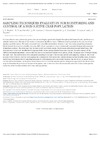Identificador persistente para citar o vincular este elemento:
https://accedacris.ulpgc.es/jspui/handle/10553/72806
| Título: | Sampling techniques evaluation for monitoring and control of a non-native crab population | Autores/as: | Martín García, Jose Antonio Triay Portella, Raül Lorenzo Nespereia, J. M. Bodero-Izquierdo, I González, José Antonio Luque Escalona, Ángel González Pajuelo, José Mario |
Clasificación UNESCO: | 310512 Ordenación y conservación de la fauna silvestre | Palabras clave: | Cronius ruber Non-native Sampling techniques Species - Abundance distribution Gran Canaria |
Fecha de publicación: | 2019 | Publicación seriada: | Frontiers in Marine Science | Conferencia: | XX Iberian Symposium on Marine Biology Studies (SIEBM XX) | Resumen: | Cronius ruber is a non-native crab species who has now largely spread and adapted throughout the Canary Islands (north-eastern Atlantic) in few years. The aim of this work is to determine the effectiveness of different sampling techniques for the control and monitoring of this species. The study was carried out in six different locations, between 2 and 6 m depth, around Gran Canarias Island. In each location two scientific divers installed 2 fixed transepts on a rocky-bottom and 2 on sandy-bottom with seagrasses (Cymodocea nodosa). The techniques that we have tested were visual census, visual census with attractors and baited traps. The transepts were 75 m2 and the effective fishing area (EAF) of each group of baited traps was 1,650 m2. In each transept, all the different techniques mentioned were carried out. Due to the nocturnal activity of the species, all the techniques were developed during the night time. The crab densities were compared according to the type of the bottom, and for each sampling technique. The visual censuses with attractors were the most appropriate technique for determinate the crab abundances in high densities areas. However, baited traps were more effective sampling technique for determinate a low crab density location. The use of one technique versus another will be determined by the phase of evaluation and control of the invasive species, being more appropriate the use of baited traps to determine the presence or absence of the species, and on the other hand the census with attractors allows a more precise evaluation of the density evolution of Cronius ruber population. | URI: | https://accedacris.ulpgc.es/handle/10553/72806 | ISSN: | 2296-7745 | DOI: | 10.3389/conf.fmars.2019.08.00110 | Fuente: | Frontiers in marine science [ISSN 2296-7745] |
| Colección: | Ponencias |
Visitas 10
373
actualizado el 15-ene-2026
Descargas
176
actualizado el 15-ene-2026
Google ScholarTM
Verifica
Altmetric
Comparte
Exporta metadatos
Los elementos en ULPGC accedaCRIS están protegidos por derechos de autor con todos los derechos reservados, a menos que se indique lo contrario.
